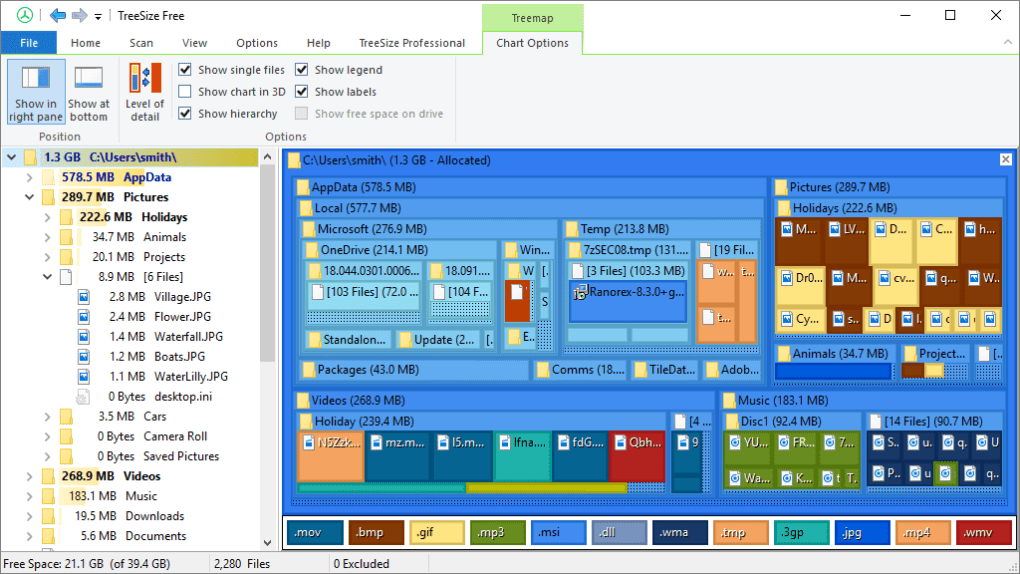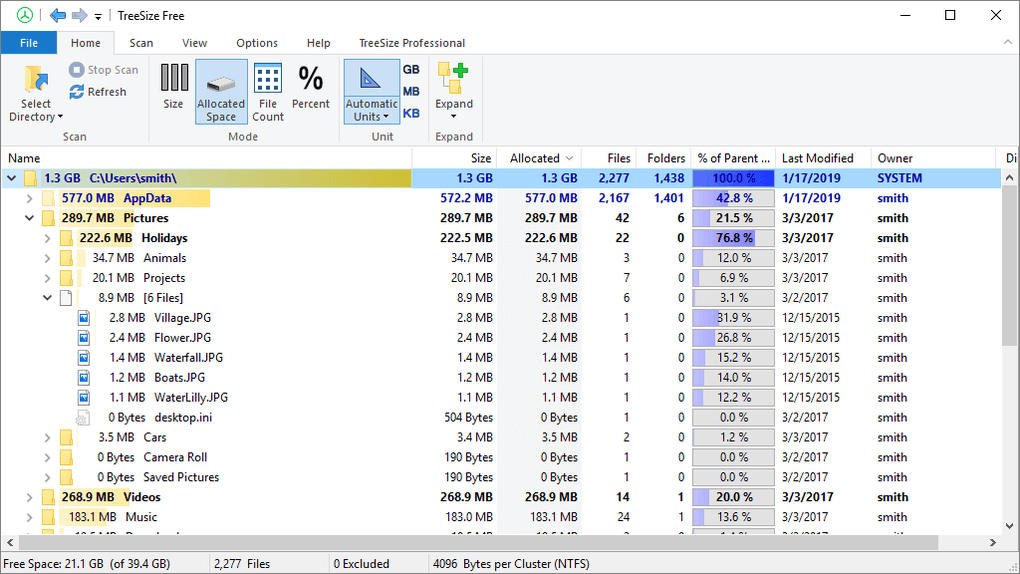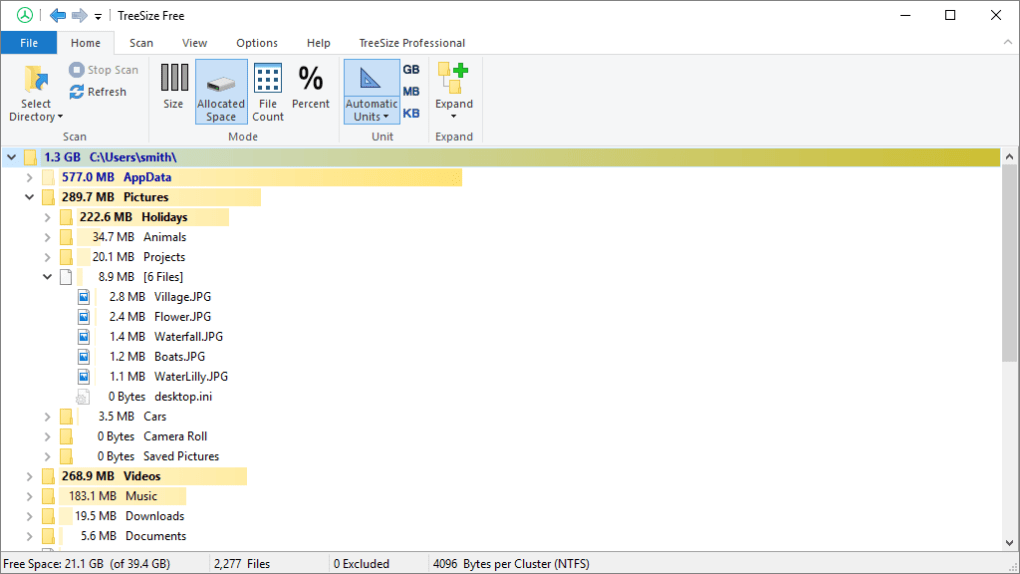TreeSize is a free disk space analysis utility developed by JAM Software GmbH, designed to help Windows users effectively manage and understand their computer’s storage usage. Compatible with all Windows versions from Vista onwards, including Windows 11, TreeSize provides a user-friendly interface for visualizing and analyzing disk space consumption, allowing users to identify and address storage issues proactively. This detailed review explores TreeSize’s features, functionality, and comparison with alternative software, highlighting its strengths and weaknesses.
Understanding Your Disk Space: TreeSize’s Core Functionality
In today’s digital world, where terabytes of storage are readily available, it’s easy to overlook the gradual accumulation of files and programs that consume valuable disk space. TreeSize addresses this problem by providing a clear and intuitive visualization of file and folder sizes within your system. Its core function is to scan your hard drives (and even external storage devices via MTP and WebDAV), presenting the data in easily digestible formats. This granular level of detail allows users to pinpoint precisely which files and folders are contributing the most to storage consumption.
The default view presents a hierarchical tree-like structure, clearly showing the size of each folder and its subfolders. This tree-view mode offers a good balance between detailed information and readability. For those needing a more visually immediate representation, TreeSize also offers a three-dimensional treemap chart. While more visually cluttered than the tree-view, the 3D view provides a quick, at-a-glance assessment of storage allocation, allowing users to rapidly identify large files or folders that need attention. This view is particularly beneficial when actively searching for files to delete to free up space.

Navigating TreeSize’s Interface and Features
TreeSize’s strength lies in its seamless integration with the Windows File Explorer. The application integrates directly into the context menu, allowing users to quickly launch a scan of any selected folder or drive directly from File Explorer. This intuitive integration enhances usability and reduces the need to navigate separate applications. The interface is clean and straightforward, utilizing familiar Windows conventions, making it easy for both novice and experienced users to navigate.
Beyond the basic scanning and visualization features, TreeSize offers advanced options to customize the scanning process. Users can set filters to include or exclude specific file types, allowing them to focus on particular areas of concern. For instance, if a user wants to identify all images consuming significant space, they can easily filter the scan to show only image files (.jpg, .png, .bmp, etc.), providing a highly targeted analysis. The program allows for flexibility in display options, showing data in various formats: size, allocated space, percentage of total space, file count, and more. This allows users to tailor the analysis to their specific needs and preferences.

Furthermore, TreeSize isn’t limited to local storage. It can also scan cloud and network drives, providing a complete picture of storage usage across all connected devices and services. This feature is incredibly helpful for users with multiple storage locations or those heavily reliant on cloud storage solutions.
TreeSize’s Professional Edition: Enhanced Capabilities
While the free version of TreeSize offers a robust set of features sufficient for many users, a professional edition is also available, offering additional capabilities. The professional tier includes automation and scripting options, allowing for more advanced tasks such as scheduled scans and automated reporting. It also provides a portable version, installable on a USB drive for use on various machines without installation. Lastly, the professional edition offers support for Windows Server environments, making it a suitable choice for server administrators needing to monitor storage usage on server systems.
A 30-day free trial of the professional version is available, allowing users to test the additional features and decide if the upgrade is worthwhile based on their specific requirements. The free version, however, offers more than enough functionality for casual users simply needing a clear understanding of their disk space usage.

TreeSize vs. WinDirStat: A Comparative Analysis
While TreeSize is an excellent disk space analyzer, it’s not the only option available. One notable competitor is WinDirStat, another free disk cleanup tool that offers similar functionalities. Both applications provide visual representations of disk usage, helping users identify space-consuming files and folders. However, significant differences exist in their approaches and user experience.
WinDirStat presents its findings in three distinct views: directory view, treemap view, and extension view. While offering comprehensive information, the interface can feel somewhat less intuitive than TreeSize’s integration with File Explorer. Moreover, a crucial difference lies in safety. WinDirStat doesn’t restrict users from deleting system files, potentially leading to system instability if users inadvertently delete critical system components. This lack of safeguards makes WinDirStat less suitable for novice users.
TreeSize, on the other hand, excels in its smooth integration with the Windows File Explorer. This seamless integration makes it feel like a natural extension of the operating system, improving the overall user experience. The familiar context menu integration and keyboard shortcuts make navigation exceptionally intuitive and comfortable for users already familiar with Windows. This subtle difference significantly enhances the usability and efficiency of TreeSize for many users.
Ongoing Improvements and System Enhancements
JAM Software consistently updates TreeSize, addressing bugs and implementing improvements to enhance the user experience. Past updates have included resolving various formatting errors, fixing file renaming issues, correcting errors related to the file search function (particularly concerning traditional Chinese language support), and reinstating the sorting by check state feature. The developers have also addressed issues such as abrupt application freezing during ZIP file searches and improved integration with Windows 11’s context menu. Further improvements include handling potential errors during SharePoint scans and MD5 hash calculations for partially unreadable ZIP files, as well as enabling seamless snapshot creation or shadow copy operations on ReFS disks. These ongoing enhancements reflect a commitment to maintaining a high-quality, stable, and user-friendly application.
Conclusion: A Powerful and User-Friendly Tool for Disk Space Management
TreeSize is a valuable addition to any Windows user’s toolkit. Its ability to quickly and efficiently scan folders and drives, coupled with its intuitive interface and smooth integration with File Explorer, makes it a powerful tool for managing disk space. The flexibility offered by various viewing modes and filtering options allows users to tailor their analysis to specific needs, ensuring they gain the most precise and relevant insights into their storage usage. While the professional version offers enhanced capabilities, the free version is more than sufficient for most users, providing all the essential tools to identify and address disk space concerns effectively. The consistent updates and improvements further solidify TreeSize’s position as a leading and reliable disk space analysis application for Windows.
File Information
- License: “Free”
- Latest update: “June 2, 2025”
- Platform: “Windows”
- OS: “Windows 8”
- Language: “English”
- Downloads: “328.8K”
- Size: “42.67 MB”
















